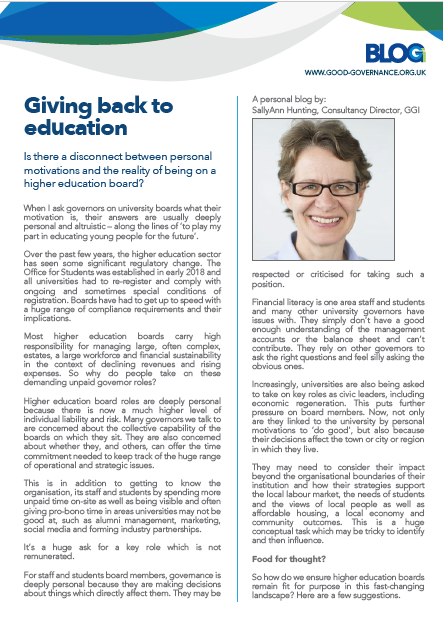Giving back to education
10 March 2020

Is there a disconnect between personal motivations and the reality of being on a higher education board?
When I ask governors on university boards what their motivation is, their answers are usually deeply personal and altruistic – along the lines of ‘to play my part in educating young people for the future’.
Over the past few years, the higher education sector has seen some significant regulatory change. The Office for Students was established in early 2018 and all universities had to re-register and comply with ongoing and sometimes special conditions of registration. Boards have had to get up to speed with a huge range of compliance requirements and their implications.
Most higher education boards carry high responsibility for managing large, often complex, estates, a large workforce and financial sustainability in the context of declining revenues and rising expenses. So why do people take on these demanding unpaid governor roles?
Higher education board roles are deeply personal because there is now a much higher level of individual liability and risk. Many governors we talk to are concerned about the collective capability of the boards on which they sit. They are also concerned about whether they, and others, can offer the time commitment needed to keep track of the huge range of operational and strategic issues.
This is in addition to getting to know the organisation, its staff and students by spending more unpaid time on-site as well as being visible and often giving pro-bono time in areas universities may not be good at, such as alumni management, marketing, social media and forming industry partnerships.
It’s a huge ask for a key role which is not remunerated.
For staff and students board members, governance is deeply personal because they are making decisions about things which directly affect them. They may be respected or criticised for taking such a position.
Financial literacy is one area staff and students and many other university governors have issues with. They simply don’t have a good enough understanding of the management accounts or the balance sheet and can’t contribute. They rely on other governors to ask the right questions and feel silly asking the obvious ones.
Increasingly, universities are also being asked to take on key roles as civic leaders, including economic regeneration. This puts further pressure on board members. Now, not only are they linked to the university by personal motivations to ‘do good’, but also because their decisions affect the town or city or region in which they live.
They may need to consider their impact beyond the organisational boundaries of their institution and how their strategies support the local labour market, the needs of students and the views of local people as well as affordable housing, a local economy and community outcomes. This is a huge conceptual task which may be tricky to identify and then influence.

Food for thought?
So how do we ensure higher education boards remain fit for purpose in this fast-changing landscape? Here are a few suggestions.
- Consider paying governors – the Committee of University Chairs is currently looking at whether the volunteer model still works and if there’s a case for remunerating boards given the increasing expectations and time commitments plus the need for board diversity.
- Induct board members thoroughly – especially around financial literacy, estate management and regulations. This builds overall board capacity and reduces reliance on the few people recruited for their accounting or financial experience.
- Ensure board composition is diverse and refreshed by a robust succession plan – this will ensure people can be recruited early on and trained up over the summer holidays so they can hit the ground running. It’s also critical for student and staff positions which often only have a year’s tenure.
- Set expectations on time commitment up front – this is vital because independent board members often form the backbone of the university sub- committee governance structure and drive the vital work which gets done outside the board meetings.
- Put effort into building high levels of trust – it’s hard if you only meet four times a year in term time to form strong relationships and to rely on fellow board members. More needs to be done to promote collaborative decision-making while ensuring critical challenge and this can only be done where there are high levels of trust.
- Decide whether the civic university model is right for your university – it won’t suit all but it will require careful planning to achieve the right board members in the right place at the right time to make these long-term, high-impact decisions.
Being a board member in higher education is such an important role. But in order to attract the best to these vital and fast-changing public institutions, the passionate, personal decision needs to be weighed against certain caveats. It’s a challenge I’m sure universities will rise to.


